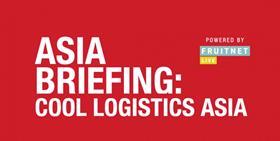
The cold chain and logistics sectors are facing new and existing challenges in a post-pandemic environment, issues addressed by Asia Briefing: Cool Logistics Asia as a preview to the upcoming forum.
The online event on 4 November was the fifth of a series of weekly market updates being hosted by Fruitnet ahead of Asia Fruit Logistica ON.
Chris White, managing director of Fruitnet Media, spoke to Alex von Stempel, director of Freshwater Logistics, to find out what will be the topics of discussion at this year’s Cool Logistics Asia forum, which will be livestreamed from 15:00 Singapore/China time each day on 18-20 November 2020.
The themes of each of the three days are transport capacity and logistics risk, new opportunities and perishable logistics solutions, and technology, transparency and fresh produce e-commerce respectively.
Discussing the first day of the programme von Stempel outlined the biggest challenges of the perishable logistics sector, particularly the shortage of reefer containers.
“There is the issue of the shortage of reefer containers, which we will address this year at Cool Logistics Asia,” said von Stempel.
“To see what are the lessons the shipping companies have taken away from what they have experienced earlier this year.”
Von Stempel said trade disparities were also exacerbating the longstanding reefer shortage issue and together they were causing freight rates to increase.
“Shipping companies and leasing companies have invested in more reefer containers, yet there is an increasing imbalance of trade and between the east and the west which is dictated by two major factors,” said von Stempel.
“One hand it is the pull factor into the US of dry cargo and at the same time we see the continuing pull factor for reefer containers into China, driven not by fruit but by meat.
“The main issue here is you have a disparity of reefer containers which are not in the right place, which is exacerbating the whole issue of getting the reefer container to where and when they are needed.”
The second day of Cool Logistics Asia is set to focus on new opportunities and von Stempel said thinking outside of the box for new ideas is an important approach.
“We have asked Maersk to talk about seafood at a fresh produce logistics to point out the similarities and differences between the two,” von Stempel explained.
He said the progress the seafood industry had made transporting frozen products could be applied to fruits and vegetables.
“There is an opportunity for long haul frozen vegetables if you think about the Asia market which is primarily a vegetable market,” von Stempel said.
“I’m no expecting these speakers just to provide these wonderful solutions but also to look at the challenges we will be faced with when implementing the next phase.”
The final day of Cool Logistics Asia will take a look at, technology, transparency and e-commerce and the impact of logistics.
Von Stempel said the issue of transparency was becoming an increasingly important topic and given the sometimes-fragmented nature of the cold chain, potential solutions would be valuable.
“There is a demand from the cargo owners to create as much transparency throughout the supply chain as possible, the problem Is that no one owns the cold chain, they only control a certain segment in the cold chain,” said Von Stempel.
He also detailed the different approaches that are required when working with different customers especially in the expanding and evolving e-commerce space.
“The key challenge we will have on the third day is that we have got the B2B market and the B2C market for the B2C market it is very difficult for traditional logistics operators to make money.”



